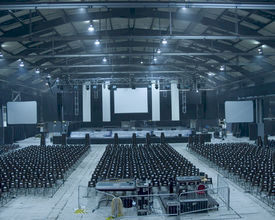Searching a good venue for your event can be a real hassle. You have to take so many things into account! Is the venue accessible enough? Is the Wi-Fi connection strong? Is the air-conditioning system adequate?
As Kevin Van Der Straeten, the founder of eventplanner.tv and author of EVENTS 2 - How to organize a successful event? notes, "The location will determine to a large extent the atmosphere, attractiveness and appeal of your event. In other words, your choice of venue can make all the difference between success and failure."
As you may already know, there’s no other option than to take the venue search seriously and be well prepared when visiting different spaces. This means that you have to visualize the spatial configuration of your event and have all your ideas clearly formulated in advance.
Here are five things you MUST know before hunting for event venues.
The type of your event and the expected number of attendees
Although you won't have an exact attendee account while you're choosing a venue, your responsibility is to decide the optimal attendance rate and then monitor the confirmation account accordingly (closing the registration if the attendee count starts to rise uncontrollably, or promoting your event more aggressively if the registration rate is low). Having this approximate number in mind, you can search for a venue according to capacity.
On the other hand, the type of your event can also decide the specificity of the venue. As author Tony Rogers notes in his book, Conferences and Conventions: A Global Industry, "The majority of corporate conferences and meetings are held in hotels. Some take place in purpose-built conference centres and management training centres. Incentive events and corporate hospitality often make use of unusual venues."
The author highlights that some corporate meetings are held in university or academic venues, especially when "such venues have invested in dedicated conference facilities with high quality."
These two parameters - the character of your event and the expected number of attendees - will narrow your options and make your venue search much easier.
The audiovisual needs of your event
Normally, the venues will cover this aspect. However, if you don't correctly assess your audiovisual needs, including any particularities, you may encounter some unpleasant surprises.
What if you planned to integrate a light show into your event and the venue cannot accommodate that request? Or what if you want to provide instantaneous translation to three languages, and the venue has only two spaces specially equipped for the interpretors? In this case, you’ll have to pay more to install a third one.
By clearly visualizing your audiovisual needs and asking concrete questions when meeting with venue providers, you’ll be able to evaluate the venue’s viability, subsequently making a wise decision.
The main event activities and requirements these dynamics include
Do you need a stage? If so, what type of stage? How do you want to set up the room? Can this venue offer that possibility?
As Kevin Van Der Straeten highlights, "You can arrange your furniture and equipment in many different ways within your available space. When choosing your layout, you need to take account of the type of event and the required net surface area per guest/participant. The total net surface area is the area of your enclosed accommodation, excluding the stage, free-standing decoration and any technical facilities."
Thus, when visiting different venues, always have the scheme of the room layout with you, just as you envision it. This way, you’ll be able to describe the exact setup of the room with venue providers and eliminate sites that cannot accommodate your layout preference.
The ambiance you want to create
The space can affect greatly the atmosphere and the vibe of your event. Of course, there's no objective method to 'assess' a venue's vibe. You will have to develop and rely on your own criteria. For example, if you want to generate a highly creative ambiance, don’t go for the hotel venues. Instead, choose a venue located in the art district of your city. On the other hand, if you want to inflict the artsy vibe, you can go for the venues provided by cultural centers or museums.
The catering type, format, and purpose
Some venues provide large catering spaces. Other venues may be perfect for your event purposes, yet the capacity of catering spaces isn’t adequate for the type of meal you want to provide.
For example, it can be good for a walking dinner and terrible for seated dinners for the same number of attendees.
On the other hand, when planning coffee breaks, you may want to configure a networking space. In this case, you must ask yourself if the venue is big enough to ensure your desired networking space layout.
Call to action
Before scheduling a meeting with venue providers, be sure to have a fairly accurate attendance estimate and a description of the room(s) layout you want, the event’s audiovisual needs, the ambience you want to create, and the catering characteristics.
Write down all of these aspects and disseminate each one in particular. Ask yourself what you’ll need to ensure your event runs smoothly. Also, write down the questions you want to ask the providers. Go to the meeting well prepared and make a smart decision when choosing your next venue.




